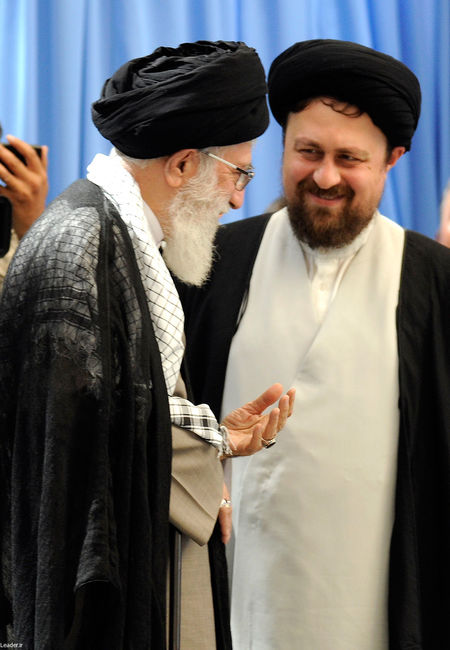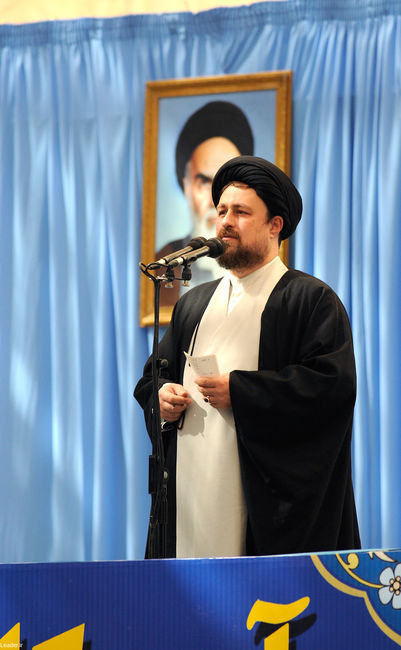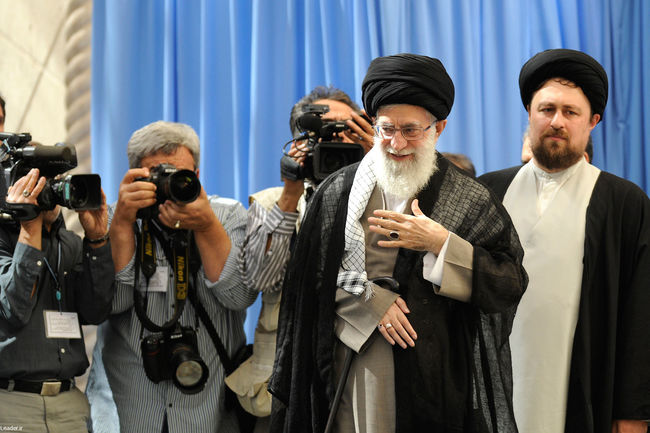Ayatollah Khamenei the Supreme Leader of the Islamic Revolution met today with a large number of people from across the country at Imam Khomeini's (r.a.) shrine. Speaking at the meeting, Ayatollah Khamenei reiterated that he does not favor any particular candidate and added: "Although foreign media will try to link my statements to particular candidates out of spite and with ulterior motives, my comments do not refer to any particular candidate. Rather, I am addressing these statements to all the candidates."
Ayatollah Khamenei the Supreme Leader of the Islamic Revolution met today with a large number of people from across the country at Imam Khomeini's (r.a.) shrine. Speaking at the meeting, Ayatollah Khamenei reiterated that he does not favor any particular candidate and added: "Although foreign media will try to link my statements to particular candidates out of spite and with ulterior motives, my comments do not refer to any particular candidate. Rather, I am addressing these statements to all the candidates."
Ayatollah Khamenei offered certain recommendations to the presidential candidates and stated: "The honorable candidates may criticize whatever they want, but they should pay attention to the fact that criticism is different from unjust attacks, pessimism and painting a bleak picture. The essence of criticism is determined efforts and intentions to resolve the existing problems and follow a glorious path."
His Eminence added: "Denying positive points is not a prerequisite for criticism. Therefore, those who want to attract the attention of the people should not deny the outstanding infrastructure-related plans and measures that have been implemented by the incumbent administration as well as previous administrations."
Ayatollah Khamenei referred to the existing economic problems, including higher prices and inflation, and added: "It is the wish of our people and government officials that the person who will be elected on the 24th of Khordad will manage to resolve our economic problems, but the candidates should not deny the work has been done when explaining their plans for resolving the existing economic problems."
The Supreme Leader of the Islamic Revolution said that the presidential candidates should not make promises that cannot be fulfilled, adding: "Speak in a way that if your recorded statements are replayed to you next year in Khordad, you do not feel ashamed and you are not forced to blame things on other people under different pretexts."
Ayatollah Khamenei said that the Constitution has given a wide range of legal powers to the president and reiterated: "The only limit that the president is faced with is the law. Of course, the law is not in fact a limiting factor. Rather, it provides guidance and shows the right path."
The Supreme Leader of the Islamic Revolution called on the presidential candidates to present their plans and promise a few things to the people: "They should promise that they will act in a wise, persistent and steadfast way."
"They should promise that they will utilize all the capacities of the Constitution in order to carry out their great presidential responsibilities. They should promise that besides managing the conditions of the country, they will pay enough attention to the economy, which is a challenge that has been imposed on the Iranian nation by foreigners."
His Eminence said that it is necessary for the presidential candidates to avoid unnecessary controversy and added: "It is necessary for you to promise our nation that if you are elected, you will not give your friends a free rein."
The Supreme Leader of the Islamic Revolution said that the candidates should promise that they will focus their efforts on safeguarding the interests of the Iranian nation against foreigners. He added: "Presenting flawed analyses, some people argue that in order to appease the enemy, it is necessary to make concessions, but this is wrong and basically it means preferring the interests of foreigners to national interests."
His Eminence reiterated: "The enemy is angry because of the vibrant existence of the Islamic Republic and because the memory, path and goals of Imam (r.a.) are alive in the minds our people. The only way to confront this anger is to make constant efforts to resolve the problems and achieve independence and national power."
Elsewhere in his statements, the Supreme Leader of the Islamic Revolution said that Imam Khomeini's (r.a.) faith in God, in the people and in himself prepared the ground for the victory, permanence and progress of the Islamic Revolution. Referring to the upcoming presidential elections, he added: "With Allah's assistance, the Iranian nation will give rise to a vibrant instance of valor in ten days and they will emerge proud and victorious out of the great test that will take place on the 24th of Khordad."
Ayatollah Khamenei referred to the historic 15th of Khordad uprising which took place in the year 1342 and described it as a very important stage in the history of Iran. He added: "Following Imam's (r.a.) arrest, which took place after his speech on the 13th of Khordad in the year 1342, there was a massive popular uprising in Tehran, Qom and several other cities, which showed the taghuti regime the strong bond between the people and the clergy."
The Supreme Leader of the Islamic Revolution stressed that the bond between the people and the clergy guaranteed the spread and victory of the popular movement in Iran. "When the people enter the arena and their hearts and minds support a movement, that movement finds the capacity for continuation and victory."
Ayatollah Khamenei said that the brutal nature of taghut was revealed on the 15th of Khordad, further adding: "One of the important points about that event was the silence of international communities and organizations that claimed to support human rights. They did not protest at all."
His Eminence stressed: "Despite all these things, Imam Khomeini (r.a.) - who was empty-handed but enjoyed the support of the people - exhibited the image of a determined and decisive spiritual leader to all people and all history."
The Supreme Leader of the Islamic Revolution referred to three important characteristics of Imam Khomeini (r.a.) and stressed: "Imam (r.a.) had genuine faith in God, in the people and in himself and he exhibited this faith in his behavior."
Ayatollah Khamenei added: "Imam Khomeini (r.a.) spoke with the people through his heart and the people accepted his call from the bottom of their hearts. They stepped into the arena, resisted bravely and gradually lead this movement towards victory. Finally, this movement achieved victory without having received help from any country."
The Supreme Leader of the Islamic Revolution reiterated: "Imam (r.a.) had faith in God and His promise of assistance with all his heart and soul. For this reason, all his actions and moves were for God alone."
His Eminence added: "Imam (r.a.) had deep faith and confidence in the people as well. He believed that the faithful, intelligent and brave people of Iran could shine brightly like the sun in different areas only if they had competent leaders."
Ayatollah Khamenei stressed: "In the eyes of Imam (r.a.), the people were the dearest and their enemies were the most hated, and this belief was one of the essential reasons behind the resistance of Imam against the domineering powers that were hostile towards the Iranian people."
The Supreme Leader of the Islamic Revolution referred to Imam Khomeini's (r.a.) faith in himself and reiterated: "Imam (r.a.) revived the spirit of self-confidence in our nation and he helped our people realize their capacities in different areas."
His Eminence referred to Imam Khomeini's (r.a.) courageous actions before and after the Revolution and his confrontation with global oppressors and added: "Courage, decisiveness and self-confidence - which were exhibited in Imam's (r.a.) words and actions - were gradually transferred to the people and this caused our nation to become a role model of resistance and insight."
The Supreme Leader of the Islamic Revolution added: "It was thanks to this self-confidence and courage that Imam (r.a.) never suffered from the slightest bit of depression, doubt and weakness even during the last few days of his auspicious life. For this reason, the statements that he issued during the last few years of his life were more revolutionary and strongly worded than the statements he had issued during the first few years of the movement."
His Eminence said that the people had faith in Imam Khomeini's (r.a.) slogans and added: "Thanks to their self-confidence and hope and their reliance on God, the people of Iran overcame the despair of the oppressive Pahlavi era and they became the manifestation of pride and progress through making achievements in different areas."
The Supreme Leader of the Islamic Revolution said that liberating Iran from dependence on America and England, replacing corrupt and treasonous leaders with elected leaders, transforming Iran from a backward country into a country whose rate of scientific progress is eleven times more than the global average, and Iran's praiseworthy advances in areas relating to development, science, medicine and higher education are among the blessings of the great movement that was started by Imam Khomeini (r.a.).
Ayatollah Khamenei stressed that Iran's advances and achievements over the past three decades should not cause a false sense of pride. "If we compare our conditions with the era of taghut, these achievements will look remarkable, but if we compare our conditions with an ideal Islamic Iran - namely, a society that enjoys dignity, welfare, morality, piety and spirituality - there is definitely a long way to go."
His Eminence stressed: "This long but glorious path can be traversed by relying on the three beliefs of Imam Khomeini (r.a.). By relying on its pious youth and those three beliefs, the Iranian nation can swiftly build an ideal Islamic Iran."
The Supreme Leader of the Islamic Revolution stressed that there are bright prospects for the Iranian nation and added: "The roadmap is available to the Iranian nation and this roadmap is the principles that were introduced by Imam (r.a.)."
Ayatollah Khamenei reiterated: "Imam's principles, which have been recorded in his published speeches and his testament, are the same things that turned the backward and dependent Iranian nation into a pioneering, proud and independent nation."
His Eminence stressed: "Those who mention the name of Imam (r.a.) and try to attract support in this way should have faith in Imam's principles and roadmap. This is because the only way to understand and follow the essence of Imam's character is to rely on his principles and roadmap."
The Supreme Leader of the Islamic Revolution referred to Imam Khomeini's principles in the area of foreign policy and stated that the requirements are "reliance on the votes of the people, ensuring unity of the people, rulers and leaders who are populist and non-aristocratic, officials who are committed to national interests and efforts by everybody in order to achieve progress."
Ayatollah Khamenei added: "Resistance against interventionist and domineering policies, establishing brotherly ties with Muslim nations, establishing equality-based relations with all countries except those that have been hostile towards the Iranian nation, fighting the Zionists, fighting to liberate Palestine, supporting oppressed people and confronting oppressors are among Imam's (r.a.) principles in the area of foreign policy."
His Eminence referred to Imam Khomeini's (r.a.) principles in the area of culture and stated: "Imam's (r.a.) principles in this area include: rejecting the permissive Western culture, rejecting rigidity, rejecting hypocrisy in religious matters, defending Islamic ethics and commands in a determined way and fighting the spread of immorality and corruption in society."
The Supreme Leader of the Islamic Revolution referred to Imam Khomeini's (r.a.) principles in economic areas and said: "Stressing national economy and self-sufficiency, observing economic justice in production and distribution, defending underprivileged people, fighting the capitalist culture, showing respect for ownership, capital and labor, refusing to melt into the global economy and preserving independence of the national economy are among the economic principles of Imam (r.a.)."
Ayatollah Khamenei stressed: "Imam (r.a.) constantly demanded that government officials of the country should implement these principles in a powerful and wisely managed way."
His Eminence stressed that such principles constitute Imam Khomeini's (r.a.) roadmap and reiterated: "By relying on its firm religious faith and its internal capabilities and capacities, and through benefitting from Imam's (r.a.) roadmap, the Iranian nation can continue the path that it has been following over the past 34 years with more power and more speed, thereby becoming a genuine and complete role model for Muslim nations."
Elsewhere in his statements, Ayatollah Khamenei referred to the upcoming presidential elections and described it as very sensitive.
Ayatollah Khamenei said that the elections in the Islamic Republic are the manifestation of having faith in God, in the people and in oneself, further adding: "Elections are a manifestation of faith in God because it is a religious obligation to play a role in the determining the destiny of the country."
His Eminence reiterated: "Elections are a manifestation of having faith in the people because in an election it is the people who choose their government officials."
The Supreme Leader of the Islamic Revolution added: "Elections are a manifestation of self-confidence because any ballot that is cast into the ballot box is in fact an attempt to play a role in the destiny of the country."
Ayatollah Khamenei said that the most important point regarding the upcoming presidential elections is the necessity of giving rise to political valor as well as enthusiastic presence of the people in the election. "Every vote that the people cast into the ballot box is primarily a vote of confidence for the Islamic Republic and for our electoral mechanism."
His Eminence added: "On a less important level, this vote is also a vote of confidence for any person who is subjectively judged to be more beneficial for the future of the country."
The Supreme Leader of the Islamic Revolution referred to the efforts by the enemies of Iran to turn the upcoming election into a threat for the Islamic Republic and stated: "They hope that the election will be lifeless or followed by a fitna, as was the case with the 1388 election, but the enemies have made a mistake in their calculations because they do not know our nation and they have forgotten what happened on the 9th of Dey."
His Eminence stressed: "By Allah's grace and despite the will and plans of the enemies, the election that will be held on the 24th of Khordad will be a great opportunity for the Islamic Republic."
Ayatollah Khamenei added: "The enemies think that there is a silent majority in the country who are opposed to the Islamic Republic. However, they have forgotten the annual rallies on the 22nd of Bahman: over the past 34 years, massive numbers of people have always taken to the streets in order to defend the Islamic Republic and shout ‘death to America'."
His Eminence said that the ill-wishers of the Iranian nation and their think tanks have resorted to false claims that the election will be engineered or that it is not a legitimate and free election. He reiterated: "In which part of the world are candidates - ranging from famous figures to unknown individuals - allowed to use national media outlets equally?"
The Supreme Leader of the Islamic Revolution said: "In America and other capitalist countries, if a candidate is not a member of the existing two or three parties and if he is not supported by the mafia of wealth and power and by the Zionist network, he has no opportunities for campaigning."
Ayatollah Khamenei said that the law has the final say on the process of election in Iran and stressed: "In the Islamic Republic, the law is the only thing that restricts the entry of candidates into the arena of elections. On the basis of the law, some people can stand for our elections and some others cannot. Moreover, those who are responsible for the vetting process have been specified by the law."
He added: "Foreign enemies close their eyes to these realities and broadcast false propaganda and unfortunately certain impious voices and writers repeat the same things inside the country."
The Supreme Leader of the Islamic Revolution stressed: "By Allah's grace, with its presence and firm determination, the Iranian nation will produce a decisive and crushing response to all these machinations."
At the end of his statements, Ayatollah Khamenei stressed: "In ten days, the Iranian nation will go through a great test and I hope that by Allah's favor, our nation will emerge victorious and proud out of this great divine test by giving rise to an auspicious instance of valor and produce great outcomes."



